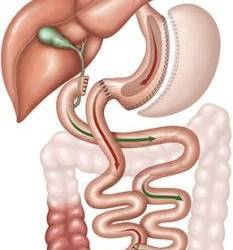#duodenal switch
Text
Alive!


I am alive. Again. Work and school has swallowed me up completely. I am almost 3 months post-op and nearly 80 pounds down. Having weight loss surgery was the best decision I could have ever made!
13 notes
·
View notes
Text
youtube
#simply selicia#body and mind#duodenal switch#bariatriccommunity#bariatric surgery#weight loss#weight loss journey#Youtube
2 notes
·
View notes
Text
Duodenal Switch Surgery: Is It Right for You?

What is Duodenal Switch Surgery? Duodenal switch surgery, also known as biliopancreatic diversion with duodenal switch (BPD/DS), is a complex procedure that combines restrictive and malabsorptive elements to achieve weight loss. Unlike purely restrictive procedures like gastric banding, the duodenal switch surgery involves both reducing stomach size and rerouting the small intestine to limit nutrient absorption.
How Does It Work? During duodenal switch surgery, the surgeon removes a portion of the stomach to create a smaller pouch, significantly reducing its capacity. This restrictive aspect limits the amount of food intake, promoting feelings of fullness with smaller meals. Additionally, a portion of the small intestine is rerouted to bypass the majority of the stomach and the upper portion of the small intestine, where nutrient absorption primarily occurs. This malabsorptive component further contributes to weight loss by reducing the number of calories and nutrients absorbed from food.
Is Duodenal Switch Surgery Right for You? Duodenal switch surgery is typically recommended for individuals with severe obesity (BMI of 50 or higher) or those with a BMI of 40 or higher who have significant obesity-related health issues such as type 2 diabetes, hypertension, or obstructive sleep apnea. Additionally, candidates for duodenal switch surgery should have a strong commitment to lifestyle changes and long-term follow-up care to optimize outcomes.
Benefits of Duodenal Switch Surgery:
Significant Weight Loss: Duodenal switch surgery has been shown to result in substantial and sustained weight loss, often greater than other bariatric procedures.
Improvement in Metabolic Conditions: Many patients experience resolution or improvement in obesity-related health conditions such as type 2 diabetes, hypertension, and dyslipidemia.
Long-Term Success: Studies indicate that duodenal switch surgery has durable outcomes, with many patients maintaining significant weight loss and metabolic improvements over the long term.
Enhanced Quality of Life: Beyond weight loss, many individuals report improvements in overall well-being, mobility, and self-esteem following duodenal switch surgery.
Considerations and Potential Risks: While duodenal switch surgery offers significant benefits, it’s important to consider potential risks and complications, including:
Nutritional deficiencies due to reduced absorption of vitamins and minerals, necessitating lifelong supplementation.
Dumping syndrome, a condition characterized by rapid gastric emptying and associated symptoms such as nausea, vomiting, and diarrhea.
Increased risk of surgical complications compared to purely restrictive procedures.
The need for lifelong commitment to dietary modifications, regular exercise, and ongoing medical follow-up.
About Dr. Shashank Shah: Dr. Shashank Shah, a renowned expert in bariatric surgery and metabolic diseases, has been at the forefront of advancing innovative surgical techniques like duodenal switch surgery. With a wealth of qualifications and experience, including an M.B.B.S., M.S., FAIS, Dr. Shah is dedicated to providing comprehensive care and personalized treatment plans to patients seeking weight loss solutions.
As the Director of the Laparo-Obeso Centre, Dr. Shah leads a multidisciplinary team of experts committed to helping individuals achieve their weight loss goals and improve their overall health. His patient-centered approach emphasizes thorough preoperative evaluation, meticulous surgical technique, and ongoing support to ensure optimal outcomes and long-term success.
Conclusion: Duodenal switch surgery offers a promising solution for individuals struggling with severe obesity and related health conditions, providing significant weight loss and metabolic improvements. However, it’s crucial to thoroughly evaluate your individual circumstances and consult with a qualified bariatric surgeon like Dr. Shashank Shah to determine if this procedure is right for you.
With expert guidance and comprehensive support, you can embark on a transformative journey towards a healthier, more fulfilling life with duodenal switch surgery. If you’re ready to take control of your weight and improve your health, don’t hesitate to explore this option and take the first step towards a brighter, healthier future.
0 notes
Text
0 notes
Text
I am just starting this blog on my positive and negatives of my Bariatric history. Hoping my experiences, both good and bad can reach out and help/support others.
1 note
·
View note
Text
The Obesity Epidemic.
Is Obesity an Epidemic?
Did you know that obesity is now considered an epidemic in the United States? According to the Centers for Disease Control and Prevention, more than one-third of American adults are obese.
This means they are at a higher risk of developing heart disease, stroke, type 2 diabetes, and other serious health conditions.
In this blog post, we will discuss the causes of…

View On WordPress
#abdomnal#adjustable gastric banding#bariatric surgery#BMI#bodyfat#calories#cancer#CDCP#consumption.metaboic#duodenal switch#energy#epidemic#Exercise#fat#food intake#gastric bypass#health problem#heart disease#high fiber#infertility#losing weight#medical condition#metabolism#obese#obesity#overweight#protein#sleep apnea#sleeve gastrectomy#stroke
0 notes
Text
Surgery can be a life-changing event, especially for those considering bariatric surgery options such as a duodenal switch. A duodenal switch is a popular choice for individuals seeking weight loss solutions. To ensure the best possible outcome, it’s vital to follow essential nutrition guidelines after the surgery. This article will provide you with practical advice for adjusting your diet and lifestyle to support your overall health and weight loss goals post-surgery.
Learn more - https://wellnessphx.com/understanding-the-nutrition-guidelines-for-successful-duodenal-switch-surgery/
0 notes
Text
Duodenal switch surgery is the last resort for all weight regain risks
Gaining weight at an unstoppable rate isn’t good for an adult, middle-aged woman, or a man. To deal better with the situation, personalizing quicker with the world-class duodenal switch recovery rate adds value without thinking twice. Even long-term freedom from frustration and heart attack can be availed anytime and from anywhere. A proper balance between the food consumption and abosrption is established so that digestion goes smooth. Lighter Dream and the efficient and highly knowledgeable team of bariatric surgeons take the complications involved in Duodenal Switch Mexicosurgery seriously.
0 notes
Text
Types of Bariatric Surgery - Gastric Bypass, Sleeve Gastrectomy & More
Bariatric surgery is a highly effective weight loss treatment for those with a BMI of 40 or higher. Learn about the different types of bariatric surgery including gastric bypass, sleeve gastrectomy, and more. Find out about the benefits, risks, and postoperative care.
#Bariatric surgery#Gastric bypass surgery#Sleeve gastrectomy#Adjustable gastric band surgery#Biliopancreatic diversion with duodenal switch
0 notes
Link
Indicure is one of the best medical tourism companies in India and provides various kinds of procedures such as bariatric surgery, dental treatment, neurosurgery at an affordable cost. To know gastric banding surgery cost in India, share your medical report with our manager. He will provide estimated cost of surgery and final cost shall be confirmed after consultation with the surgeon.
#gastric banding surgery cost in India#gastric banding surgery in India#bariatric surgery#duodenal switch surgery#gastric balloon surgery cost in India#Indicure#plastic surgery in India
0 notes
Text
Hello everyone! I'm excited to start this blog and share my weight loss journey with you all.
I'm sure many of us can relate to the struggles of trying to lose weight, especially after having the SADI surgery.
What is SADI-S: SADI-S (Single anastomosis duodeno-ileal bypass with sleeve gastrectomy) is a newer variant of duodenal switch surgery, which for three decades has helped obese patients control their weight. The key benefit of SADI-S is that one intestinal bypass is made, rather than two, resulting in less time in surgery and reduced risk of intestinal leakage.
Let's look at the rollercoaster a little👇🏾👇🏾:
I remember feeling so hopeless before my surgery, like I was stuck in a never-ending cycle of dieting and gaining weight back. But since having the surgery, l've noticed a significant change in my appetite and eating habits. It's amazing how much more mindful I am now about what l put into my body.
However, the journey isn't without its challenges. There are days when I feel like giving up, when the cravings are too strong, or when I don't see the results I want as quickly as I'd like. That's why I'm so grateful for this group and the support that comes with it. Knowing that I'm not alone in this journey and that there are others who understand what I'm going through is incredibly comforting.
So, l'd love to hear from you all! How has your weight loss journey been so far? What are some of the challenges you've faced, and how have you overcome them?
HW: 322
SW: 303 12/13/23
CW: 277.8 01/31/24

#i wanna lose weight#weight loss#weight loss surgery#weight#weight management#BlackGirlsSadi#SADISurgery#gastric sleeve#gastric bypass#vsg#vsgjourney#vsgcommunity#losing weight
9 notes
·
View notes
Text
youtube
Hey everyone, I can't believe I am officially 5 months post-op from Duodenal Switch Surgery! I think the duodenal switch of course comes with it's own set of complications, but there's plenty of benefits as well. I hope I could give a good glimpse into the benefits that I've received from bariatric surgery, but also things that are challenging. There's a lot of recovery and learning with weight loss surgery, but honestly I would do it all again.
#simply selicia#mental health#bariatricsurgery#bariatric community#duodenal switch#duodenal switch surgery#bariatricsuccess#bariatric post op#duodenal switch post op#weightloss surgery#weightloss#Youtube
1 note
·
View note
Text
A Comprehensive Guide to Duodenal Switch Surgery: Expectations and Qualifications
Introduction: Duodenal Switch Surgery, also known as biliopancreatic diversion with duodenal switch (BPD/DS), is a complex bariatric procedure designed to achieve significant weight loss and improve metabolic health. For individuals struggling with severe obesity and related health conditions, understanding what to expect from this surgery and who qualifies for it is crucial. In this guide, we'll delve into the intricacies of Duodenal Switch Surgery, shedding light on the procedure itself, recovery process, expected outcomes, and the criteria for candidacy. Additionally, we'll introduce Dr. Shashank Shah, an esteemed expert in bariatric and gastrointestinal surgery, whose expertise further enriches our understanding of this transformative procedure.
Understanding Duodenal Switch Surgery: Duodenal Switch Surgery is a two-part procedure that involves both restrictive and malabsorptive components. During the surgery, the stomach is significantly reduced in size to restrict food intake, similar to other bariatric surgeries like gastric sleeve. Additionally, a portion of the small intestine is rerouted to reduce the absorption of calories and nutrients, leading to further weight loss.
What to Expect from Duodenal Switch Surgery:
Preoperative Preparation: Before undergoing Duodenal Switch Surgery, patients will undergo a comprehensive evaluation, including medical history review, physical examination, and possibly psychological assessment. Preoperative counseling and education are essential to ensure patients understand the procedure, its risks, and the necessary lifestyle changes post-surgery. Surgical Procedure: Duodenal Switch Surgery is typically performed laparoscopically under general anesthesia. The surgeon will make several small incisions in the abdomen to access the stomach and small intestine. The stomach is reshaped into a smaller, banana-shaped pouch, while a portion of the small intestine is bypassed to reduce nutrient absorption. Recovery and Hospital Stay: The recovery period following Duodenal Switch Surgery varies from patient to patient but generally involves a hospital stay of 2 to 3 days. Patients will be gradually introduced to a liquid diet, followed by pureed and soft foods, before transitioning to a regular diet over several weeks. Long-Term Lifestyle Changes: Successful outcomes from Duodenal Switch Surgery require lifelong commitment to dietary modifications, regular exercise, and close medical follow-up. Patients will need to adhere to a nutrient-dense diet, monitor their vitamin and mineral levels, and attend regular check-ups with their healthcare team. Who Qualifies for Duodenal Switch Surgery:
BMI Criteria: Candidates for Duodenal Switch Surgery typically have a body mass index (BMI) of 40 or higher, or a BMI of 35 or higher with obesity-related health conditions such as type 2 diabetes, hypertension, or sleep apnea. Failed Weight Loss Attempts: Individuals who have unsuccessfully attempted to lose weight through diet and exercise or other weight loss interventions may be candidates for Duodenal Switch Surgery. Commitment to Lifestyle Changes: Candidates must demonstrate a willingness to commit to the necessary lifestyle changes post-surgery, including dietary modifications, regular physical activity, and long-term medical follow-up. Introducing Dr. Shashank Shah: Dr. Shashank Shah stands as a beacon of excellence in the field of bariatric and gastrointestinal surgery. With a robust educational background and extensive experience, Dr. Shah has established himself as a trusted authority in complex surgical procedures like Duodenal Switch Surgery.
Dr. Shah's qualifications include:
M.B.B.S. (Bachelor of Medicine, Bachelor of Surgery)
M.S. (Master of Surgery)
FAIS (Fellow of the Association of Surgeons of India)
Honorary FMAS (Honorary Fellow of the Minimal Access Surgeons of India)
Honorary FIAGES (Honorary Fellow of the Indian Association of Gastrointestinal Endo-Surgeons)
Honorary FALS (Honorary Fellow of the Association of Laparoscopic Surgeons)
Honorary FMBS (Honorary Fellow of the Maharashtra Chapter of the Association of Minimal Access Surgeons of India)
Dip. Visiting Prof. France
Medical Council Reg. No. 61837
As the Director of Laparo-Obeso Centre, Dr. Shah leads a team dedicated to providing comprehensive treatment for obesity and related metabolic diseases. The centre serves as a training hub for laparoscopic and bariatric surgery, affiliated with Boston University for its prestigious bariatric training program.
Conclusion: In conclusion, Duodenal Switch Surgery offers a transformative solution for individuals struggling with severe obesity and related health conditions. By understanding the procedure's expectations and qualifications, patients can make informed decisions about their weight loss journey. With the guidance of esteemed experts like Dr. Shashank Shah, patients can embark on a path towards improved health, well-being, and a brighter future.
0 notes
Text

Duodenal Switch Surgery: A Comprehensive Guide to Weight Loss and Health Benefits
Duodenal switch surgery is actually two separate procedures performed in one surgical session. Patients are first given a sleeve gastrectomy to dramatically reduce the capacity of their stomach – this helps to minimize both caloric intake and the production of hunger-stimulating hormones. A gastric bypass is then performed to bypass approximately half of the small intestines – this further reduces the amount of calories and fat the body can absorb in order to promote a rapid reduction in unwanted body fat.
More explore at: https://beltlinehealth.com/duodenal-switch/
#DuodenalSwitch #BariatricSurgery #WeightLossSurgery #HealthBenefits #SurgicalWeightLoss #DuodenalSwitchGuide #LongTermHealth #ObesityTreatment #WeightLossJourney #SurgicalOptions
1 note
·
View note
Text
Best Bariatric Weight Loss Surgery Center in Delhi Ncr

Dr. Tarun Mittal is a leading Bariatric surgeon in Delhi, India. He is a senior consultant surgeon with special expertise in laparoscopic,bariatric,robotic and thoracoscopic surgery at Sir Ganga Ram Super Speciality Hospital,one of the best hospitals in India . Dr. Mittal is known for his skill in performing minimally invasive bariatric surgery procedures to help patients achieve sustainable weight loss.
Sir Ganga Ram Super Speciality Hospital, Delhi
Here's a summary of Dr. Tarun Mittal's expertise:
Laparoscopic Bariatric Surgery: Dr. Mittal is an expert in performing bariatric surgery using laparoscopic techniques. This minimally invasive approach involves making small incisions in the abdomen to perform the surgery, resulting in faster recovery times and less pain compared to traditional open surgery techniques.
Types of Bariatric Surgery Performed: Dr. Mittal is proficient in performing various bariatric surgery procedures, including gastric bypass, sleeve gastrectomy, and biliopancreatic diversion with duodenal switch (BPD-DS). The most suitable procedure for a patient depends on their individual health condition and weight loss goals.
Experience and Qualifications: Dr. Mittal has extensive experience in performing bariatric surgeries. He is an alumnus of Maulana Azad Medical College, New Delhi, and has obtained his MS in General Surgery and a DNB in Laparoscopic Surgery.
If you're considering bariatric surgery in Delhi, here are some reasons to consider Dr. Tarun Mittal:
Expertise in Minimally Invasive Surgery: Laparoscopic surgery offers numerous advantages over traditional open surgery, including less scarring, quicker recovery times, and reduced pain.
Experience and Qualifications: Dr. Mittal's qualifications and vast experience make him a highly skilled and competent surgeon.
Positive Patient Reviews: Many patients have benefitted from Dr. Mittal surgical expertise and have left positive reviews about their experience.
Important Considerations Before Bariatric Surgery
Bariatric surgery is a major decision, and it's vital to understand the risks and benefits involved. Here are some essential factors to consider:
Eligibility Criteria: Not everyone qualifies for bariatric surgery. Dr. Mittal will assess your individual health condition, weight loss goals, and medical history to determine if you're a suitable candidate.
Long-Term Commitment: Bariatric surgery is a tool to aid weight loss, but it requires a long-term commitment to lifestyle changes, including healthy eating habits and regular exercise.
Potential Risks and Complications: As with any surgery, bariatric surgery carries potential risks and complications. Dr. Mittal will discuss these with you in detail before proceeding.
Conclusion
Dr. Tarun Mittal is a renowned bariatric surgeon in Delhi, India, with a proven track record of helping patients achieve successful weight loss outcomes through minimally invasive surgical techniques. If you're considering Bariatric Surgery For Weight Loss in Delhi as a treatment option for obesity, consulting with Dr. Mittal can be a step towards a healthier and more fulfilling life. Remember, consulting a qualified medical professional is essential to determine if bariatric surgery is the right choice for you.
Also Read
Best Robotic Surgeon in Delhi NCR
0 notes
Text
A Brighter, Lighter Future: The Journey of Weight-Loss Surgery
Embarking on the journey of any surgery to help lose weight is a transformative decision for those grappling with obesity and seeking a sustainable solution for a healthier lifestyle. This comprehensive exploration will guide you through the phases of considering, preparing for, undergoing, and living after weight-loss surgery, shedding light on what to expect and how to navigate each step for the best possible outcomes.

Step 1: Considering Weight-Loss Surgery
Understanding Your Options
Before taking any steps, it's crucial to understand the different types of weight-loss surgeries available, including gastric sleeve, gastric bypass, adjustable gastric band, and biliopancreatic diversion with duodenal switch. Each procedure has unique benefits and risks, tailored to different medical needs and weight-loss goals.
Evaluating Eligibility
Weight-loss surgery isn't for everyone. Candidates typically have a body mass index (BMI) of 40 or higher, or a BMI of 35 or higher with serious health conditions related to obesity, such as type 2 diabetes or high blood pressure. Consulting with a bariatric surgeon will help determine if surgery is a viable option based on your medical history and health status.
Step 2: Preparing for Surgery
Medical and Psychological Evaluations
Successful surgery requires thorough preparation, including comprehensive medical and psychological evaluations to ensure you're physically and mentally prepared for the surgery and its aftermath.
Lifestyle Adjustments
Patients often need to undergo significant lifestyle adjustments before the surgery. This may include dietary changes, quitting smoking, and starting an exercise regimen. These adjustments help reduce surgical risks and prepare the body for a quicker recovery.
Step 3: Undergoing Surgery
The Procedure
The specifics of the procedure will depend on the type of surgery chosen. Most weight-loss surgeries today are performed using minimally invasive techniques, which can lead to shorter recovery times and less discomfort.
Hospital Stay
Post-surgery, you'll typically spend a few days in the hospital under observation. This period allows the medical team to manage pain, monitor for complications, and ensure that you can perform basic activities and consume liquids.
Step 4: Post-Surgery Recovery and Adjustment
Short-Term Recovery
The initial weeks after surgery focus on healing and adjusting to new eating habits. Patients will follow a strict diet starting with liquids, progressing to pureed foods, and then to solid foods as tolerated.
Long-Term Lifestyle Changes
Long-term success depends on adhering to dietary guidelines, maintaining regular physical activity, and regularly attending follow-up appointments. Support groups and counseling can also be crucial in adjusting to new lifestyle changes and maintaining weight loss.
Monitoring and Managing Complications
While modern surgical techniques reduce risks, complications can occur. Common issues include nutritional deficiencies, which can be managed through dietary supplements and regular medical check-ups.
Step 5: Embracing a New Life
Achieving and maintaining weight loss after surgery requires a lifelong commitment to healthy eating and regular exercise. The surgery is not a cure; rather, it's a tool to help reduce weight and improve health. The real success depends on using this tool effectively by making consistent, healthy choices.
Conclusion
The journey of weight-loss surgery is about more than losing pounds; it's about gaining a healthier, more active, and fulfilling life. With the right preparation, support, and personal commitment, weight-loss surgery can be the first step towards a brighter, lighter future. Each phase of the journey brings its own challenges and rewards, requiring a comprehensive approach to ensure the best outcomes for health and well-being.
0 notes